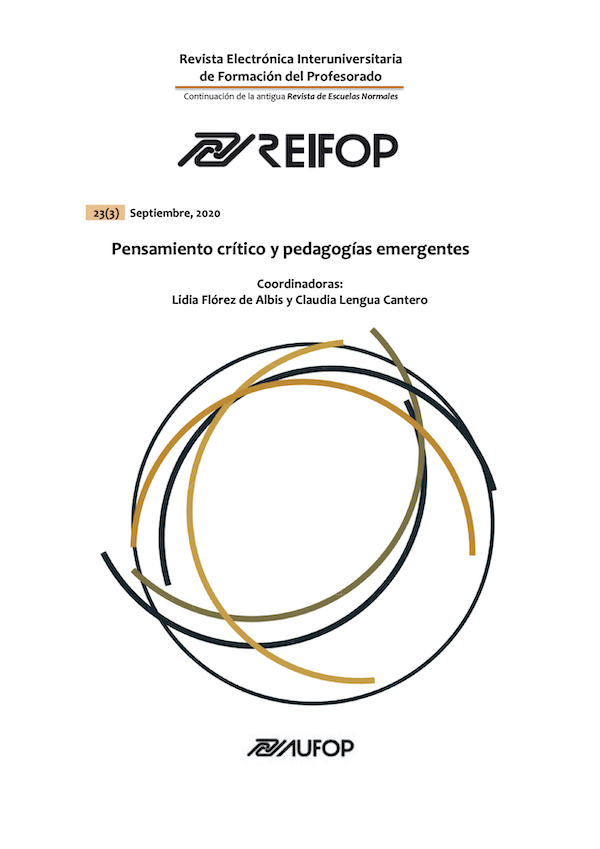Análisis de datos cualitativos a través del sistema de tablas y matrices en investigación educativa
Resumen
Este artículo tiene como objetivo aportar sistemas de análisis cualitativo de los datos generados a partir de la información obtenida en entrevistas de grupos focales y grupos de discusión como método de aprendizaje compartido y con carácter conversacional. Se han llevado a cabo entrevistas con dos grupos de expertos en educación, por una parte grupos focales formados por 4/5 profesores-asesores de centros de profesorado; por otro lado grupos de discusión formados por 4/6 profesores-mentores. Se ha utilizado un grupo de cada estrategia grupal para el análisis cualitativo de los datos, siendo los tópicos utilizados en los grupos focales “Ventajas e inconvenientes de la participación de centros educativos en redes escolares” y en los grupos de discusión “Identificación de obstáculos y barreras en el proceso de asesoramiento a docentes principiantes”. En ambos casos se ha profundizado en la conversación sobre sus propias experiencias profesionales siendo analizadas con sistemas de tablas y matrices de las cuales proponemos dos modelos. Se concluye la necesidad de utilizar modelos rigurosos de análisis sistemático de la información obtenida con el objetivo de construir teorías sólidas por parte de los entrevistados sobre los tópicos a tratar en experiencias compartidas para la construcción del conocimiento.
Descargas
-
Resumen11174
-
PDF6636
Citas
Barbour, R. S., Amo, T., y Blanco, C. (2013). Los grupos de discusión en investigación cualitativa. Madrid: Morata.
Bolívar, A. (2015). Construir localmente la capacidad de mejora: Liderazgo pedagógico y Comunidad Profesional. Comunicación presentada al XIII Congreso Nacional de Investigación Educativa. Chihuahua (México), noviembre.
Codina, L. (2019). Sintetizar y representar información cualitativa: tablas y diagramas en trabajos de final de máster y tesis doctorales. Recuperado el 25 de noviembre de 2019 de: https://www.lluiscodina.com/tablas-diagramas-investigacion-cualitativa/
Gutiérrez Brito, J. (2009). Técnicas grupales. En J. Callejo (coord.). Introducción a las técnicas de investigación social (pp. 95-115). Madrid: Ramón Areces.
García-Carretero, L., Codina, L., y Pedraza-Jiménez, R. (2016). Indicadores para el estudio de la visibilidad y del impacto de los cibermedios en el ecosistema digital. Barcelona: Editorial Digidoc.
García Calvente, M., y Mateo, I. (2000). El grupo focal como técnica de investigación cualitativa en salud: diseño y puesta en práctica. Atención Primaria, 25(3), 181-186.
Hamui-Sutton, A., y Varela-Ruiz, M. (2013). La técnica de los grupos focales. Investigación en Educación Médica, 2(1), 55-60.
Hernández, E., y Navarro, M.J. (2017). Las redes educativas para trabajar mejor desarrollando procesos de aprendizaje. Revista Electrónica de Investigación Educativa, 20 (3), 29-42.
Hernández, E., y Navarro, M.J. (2018). La participación en redes escolares locales para promover la mejora educativa, un estudio de caso. Profesorado, 22 (2), 49-68.
Ibarrola-García, S. (2012). La convivencia escolar en positivo. Madrid: Pirámide
Markee, N. (2000). Conversation analysis. Mahwah, NJ, EE. UU.: Lawrence Erlbaum.
Miles, M., y Huberman, A. (1994). Qualitative data analysis: an expanded sourcedbook. Thousand Oaks: Sage Pubications.
Miles, M., Huberman, A., y Saldaña, J. (2014). Qualitative Data Analysis. A Methods Sourcebook. London: Sage Publications.
Navarro, M.J., y Hernández, E. (2017). La colaboración en red entre profesorado de aulas específicas de autismo para promover el intercambio profesional para la inclusión educativa. Perfiles Educativos, 39 (156), 58-71.
Onwuegbuzie, A. J., Dickinson, W. B., Leech, N. L., y Zoran, A. G. (2011). Un marco cualitativo para la recolección y análisis de datos en la investigación basada en grupos focales. Paradigmas: Una Revista Disciplinar de Investigación, 3 (1), 127-157.
Saldanha da Silveira, D., Donaduzzi, Colomé, C., Teresinha Heck, T., Nunes da Silva, M., y Viviani, F. (2015). Grupo focal y análisis de contenido en investigación cualitativa. Index de Enfermería, 24 (1-2), 71-75.
Thofehrn, M. B., Montesinos, M. J., Porto, A. R., Amestoy, S. C., Arriera, I. C., y Mikla, M. (2013). Grupo focal: Una técnica de recogida de datos en investigaciones cualitativas. Index de Enfermería, 22 (1-2), 75-78.
Vivar, C., Arantzamendi, M., López-Dicastillo, O. y Gordo, C. (2010). La Teoría Fundamentada como Metodología de Investigación Cualitativa en Enfermería. Index Enfermería, 19 (4), 283-288.
Wilkinson, S. (2004). Focus Group research. En D. Silverman (ed.), Qualitative Research: Theory, method and practice (pp. 177-199). Thousand Oaks: Sage.
Wilkinson, S. (2012). Focus group methodology: A review. En G. Walden (ed), Focus Group Research (p. 181). London: Sage.
Los artículos que se publican en esta revista están sujetos a los siguientes términos:
1. El Departamento de Métodos de Investigación y Diagnóstico en Educación de la Universidad de Murcia (España), junto con el Servicio de Publicaciones de la Universitdad de Murcia (Editum) son los editores de la revista REIFOP y conserva los derechos patrimoniales (copyright) de los artículos publicados, permitiendo la reutilización de las mismos bajo la licencia de uso indicada en el punto 2.
2. Las obras se publican en la edición electrónica de la revista bajo una licencia Creative Commons Reconocimiento-NoComercial-SinObraDerivada 3.0 España (texto legal). Se pueden copiar, usar, difundir, transmitir y exponer públicamente, siempre que: i) se cite la autoría y la fuente original de su publicación (revista, editores y URL de la obra); ii) no se usen para fines comerciales; iii) se mencione la existencia y especificaciones de esta licencia de uso.
3. Condiciones de auto-archivo. Se permite y se anima a los autores a difundir electrónicamente las versiones pre-print (versión antes de ser evaluada) y/o post-print (versión evaluada y aceptada para su publicación) de sus obras antes de su publicación, ya que favorece su circulación y difusión más temprana y con ello un posible aumento en su citación y alcance entre la comunidad académica. Color RoMEO: verde.















